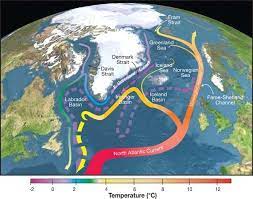
Rapidly melting glaciers on Spitsbergen do not make ‘AMOC’: good or bad?
Citaat Karel Boullart: “Scepticisme: de religie die amok maakt van alle pretenties”
Als nietig onderdeel van de kosmos ben ik geneigd op te houden met lezen over de gevolgen van klimaatverandering op aarde. Een verandering in de richting van hogere temperaturen door de hoge uitstoot van CO2 door toedoen van de mens. Ik word er moedeloos van. Zoals het bericht begin 2023 over de smeltende gletsjers op Spitsbergen: zij smolten anderhalf keer sneller dan vier jaar eerder. Om in dezelfde sferen te blijven: een sneeuwlawine van onstuitbare vervelende gevolgen voor het leven op aarde komt eraan. De temperatuur moet omlaag en flink ook. Dat betekent dus, dat 8 miljard mensen direct aan de bak moeten. Gelooft u het zelf? Ook Greta Thunberg heeft slechts een rimpeling in het sentiment kunnen brengen. Extinction Rebellion heeft een groeiend, maar nog te weinig aanhang en het woord van het jaar klimaatklever is iedereen vergeten.
Er moet dus hulp komen van de natuur zelf. De grondstof olivijn lijkt daarvoor de panacee te zijn. Fijngemalen olivijn – overal op aarde te vinden – kan uitstekend CO2 vastleggen, blijkt uit veldproeven in Delft. Het risico op nikkelvervuiling is gering. Maar het belangrijkste nieuws is toch, dat de focus op temperatuurstijging misschien onterecht lijkt te zijn, als ik de laatste berichten mag geloven over de Atlantische Golfstroom, de AMOC (Atlantic meridional overturning circulation). Door het zoetwater afkomstig uit smeltend poolijs uit bijv. Spitsbergen lijkt de Golfstroom, die warm water van de evenaar naar het noorden brengt en weer terug als koud diepzeewater, flink te vertragen. Die Golfstroom levert West-Europa een aangenaam klimaat op. Gevolg vertraging: de temperatuur op het Noordelijk Halfrond zal dalen. Onderzoek ernaar is in volle gang. De laatste stand van zaken is het onderzoek van de Denen uit juli 2023, dat de AMOC stopt in 2050. Dat is al over 27 jaar.
https://www.nature.com/articles/s41467-023-39810-w
De natuur herstelt het falen van de mens op deze manier zelf. Met alsnog de komst van een uitgestelde ijstijd.
As a tiny part of the cosmos, I tend to stop reading about the effects of climate change on Earth. A change towards higher temperatures due to the high emission of CO2 caused by humans. It makes me despondent. Such as the report in early 2023 about the melting glaciers on Spitsbergen: they melted one and a half times faster than four years earlier. To stay in the same spheres: a snow avalanche of unstoppable nasty consequences for life on earth is coming. The temperature has to drop and quite a bit. That means that 8 billion people have to go straight to work. Do you believe it yourself? Greta Thunberg, too, has only managed to bring a ripple to the sentiment. Extinction Rebellion has a growing, but still too few, following and the word of the year climate sticker has been forgotten by everyone.
So help must come from nature itself. The raw material olivine seems to be the panacea for this. Finely ground olivine – found all over the world – can capture CO2 excellently, according to field tests in Delft. The risk of nickel contamination is low. But the most important news is that the focus on temperature rise may seem unjustified, if I can believe the latest reports about the Atlantic Gulf Stream, the AMOC (Atlantic Meridional Overturning Circulation). Due to the fresh water from melting polar ice from Spitsbergen, for example, the Gulf Stream, which brings warm water from the equator to the north and back again as cold deep-sea water, seems to slow down considerably. The Gulf Stream provides Western Europe with a pleasant climate. Consequence delay: the temperature in the Northern Hemisphere will drop. Research into it is in progress. The latest state of affairs is the research of the Danes from July 2023, which the AMOC will stop in 2050. That is already 27 years from now.
https://www.nature.com/articles/s41467-023-39810-w
Nature itself corrects the failure of man in this way. With the arrival of a delayed ice age.
Ricky Turpijn



